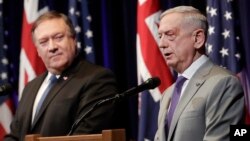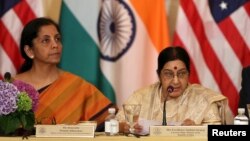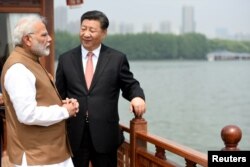U.S. pressure on India to halt oil imports from Iran and shelve major defense purchases from Russia, countries that New Delhi sees as regional allies, will feature prominently as India and the United States prepare to hold a high-level dialogue aimed at shoring up political and strategic ties.
U.S. Secretary of State Mike Pompeo and Defense Secretary Jim Mattis will meet their Indian counterparts, Foreign Minister Sushma Swaraj and Defense Minister Nirmala Sitharaman, in New Delhi on Thursday.
Billed as the inaugural “2 plus 2” dialogue, the twice-postponed talks come amid efforts to deepen the partnership as both countries seek to counterbalance China.
Waiver from US sanctions
One of the priorities at Thursday’s meeting will be firming up a key agreement that will pave the way for India to get access to high technology defense systems and allow their militaries to securely share information. The U.S. designation of India as a major defense partner in 2016 had opened the door to bolstering military cooperation.
But there are some sticking points. India will be pushing for a waiver from U.S. sanctions that target countries that conduct a significant military transaction with Russia. New Delhi is in the final stages of negotiations with Moscow to purchase a $6 billion sophisticated air defense system that will provide high altitude protection from incoming missiles. Indian officials have indicated that New Delhi intends to push ahead with the deal with a country that has been one of its biggest defense suppliers.
However, ahead of the dialogue, Randall Schriver, the Pentagon’s assistant secretary of defense for Asian and Pacific Security Affairs, said that there was no guarantee that India would get a waiver and the United States would have “very significant concerns” if India pursued major new platforms and systems from Russia.
Still, analysts in the Indian capital are optimistic the two countries will find ways to work out their differences.
“To make this a deal breaker in Indo-U.S. relationship won’t serve any purpose and I think mature minds understand this,” said Harsh Pant at the Observer Research Foundation in New Delhi. “It is not going to be a case of India getting rid of its relationship with Russia just because Americans wants it to.”
Iran oil deal
India has made no official comment on what it plans to do about its oil purchases from Iran, its third biggest supplier — the United States wants all countries to end Iranian oil purchases by November. But while India maybe willing to curb supplies, there are worries in New Delhi that pressure to bring down imports to zero could damage longstanding ties with Iran, where it is building a strategic port that will give it access to landlocked Afghanistan.
Security analyst Bharat Karnad, at New Delhi’s Center for Policy Research, said the threat of U.S. economic sanctions on countries doing business with Iran and Russia is a worry for India.
“That is the real problem. How far can you take this relationship if you have the Damocles sword of sanctions hanging over India?” he asked.
Countering China
However, the widespread expectation in New Delhi is that despite the challenges, ties between India and the United States will maintain an upward trajectory. More than anything, the relationship is being driven by mutual concerns about China’s growing military and economic clout.
“China is very much a security threat to both the United States and India, and I think we need to talk about meeting the challenge of China on so many fronts which have opened up recently,” said Lalit Mansingh, a former Indian foreign secretary.
In a symbolic gesture, the U.S. military in May this year renamed its Hawaii-based American combatant command, which oversees the Pacific region, as the U.S. Indo-Pacific Command.
As ties have improved, the United States has also become a major arms supplier to India: Purchases of U.S. defense equipment are expected to reach an estimated $18 billion by next year.
Pompeo and Mattis will also meet Indian Prime Minister Narendra Modi during their visit.


